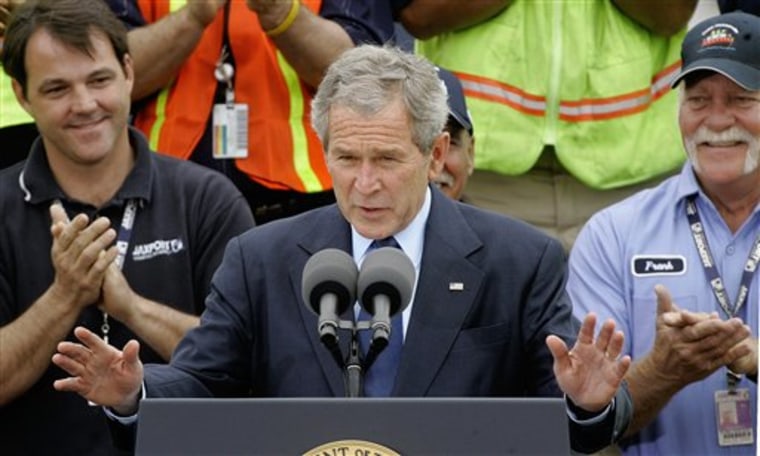Five years after launching the invasion of Iraq, President George W. Bush strongly signaled Wednesday that he will not order U.S. troop withdrawals beyond those already planned because he refuses to "jeopardize the hard-fought gains" of the past year.
As anti-war activists demonstrated around downtown Washington and in other parts of the country, the president spoke at the Defense Department to mark the war anniversary. He gave a strong defense of his decision to go to war and continue it and linked the fighting there to the global battle against al-Qaida.
"The battle in Iraq is noble, it is necessary, and it is just. And with your courage the battle in Iraq will end in victory," he told an audience of Pentagon leaders, soldiers and diplomats.
Bush made some of his most expansive claims of success in the fighting there. He said the increase of 30,000 troops that he ordered to Iraq last year has turned "the situation in Iraq around." He also said that "Iraq has become the place where Arabs joined with Americans to drive al-Qaida out."
"The surge ... has opened the door to a major strategic victory in the broader war on terror," the president said. "We are witnessing the first large-scale Arab uprising against Osama bin Laden, his grim ideology and his terror network. And the significance of this development cannot be overstated."
Bush appeared to be referring to recent cooperation by local Iraqis with the U.S. military against the group known as al-Qaida in Iraq, a mostly homegrown, though foreign-led, Sunni-based insurgency. Experts question how closely — or even whether — the group is connected to the international al-Qaida network. As for bin Laden, he is rarely heard from and is believed to be hiding in Pakistan.
The U.S. has about 158,000 troops in Iraq. That number is expected to drop to 140,000 by mid-year in withdrawals meant to erase all but about 8,000 troops from last year's increase.
Faster and larger withdrawals could unravel recent progress, Bush said.
"Having come so far and achieved so much, we are not going to let this happen," he said.
Democrats took a different view.
"On this grim milestone, it is worth remembering how we got into this situation, and thinking about how best we can get out," said Democrat congressman John Dingell on Tuesday. "The tasks that remain in Iraq — to bring an end to sectarian conflict, to devise a way to share political power and to create a functioning government that is capable of providing for the needs of the Iraqi people — are tasks that only the Iraqis can complete."
Effort to shift nation's focus
The president's address sought to shift the nation's focus from economic ills to the security gains in Iraq, part of a series of events the White House planned around the anniversary and an upcoming report from the top U.S. figures in Iraq, Gen. David Petraeus and Ambassador Ryan Crocker.
Vice President Dick Cheney just completed a two-day visit to view Iraq developments in person. Expected Republican presidential nominee John McCain also went to Iraq this week.
Cheney, asked during an ABC television interview about strong opposition in the United States to the continuing war, said he was not worried about that.
"I think you cannot be blown off course by the fluctuations in the public opinion polls," he said in a segment of the interview broadcast Wednesday on "Good Morning America."
Cheney added: "Think about what would have happened if Abraham Lincoln had paid attention to polls, if they had had polls during the Civil War. He never would have succeeded if he hadn't had a clear objective, a vision for where he wanted to go, and he was willing to withstand the slings and arrows of the political wars in order to get there."
Pause in troop drawdowns
Bush has successfully defied efforts by the Democratic-led Congress to force troop withdrawals or set deadlines for pullouts.
It is widely believed that Bush will in April endorse a recommendation from Petraeus for no additional troop reductions, beyond those already scheduled, until at least September. This so-called pause in drawdowns would be designed to assess the impact of this round of withdrawals before allowing more that could jeopardize the gains.
The surge was meant to tamp down sectarian violence in Iraq so that the country's leaders would have space to advance legislation considered key to reconciliation between rival Shiite, Sunni and Kurdish communities. The idea is that such political progress would weaken or even end the still-potent insurgency.
But the gains on the battlefield have not been matched by political progress, and violence may be increasing again. The Iraqis do not yet have a law for sharing the nation's oil wealth. Also unfinished is a plan for new provincial elections.
As of Monday, at least 3,990 members of the U.S. military have died in Iraq. More than 29,000 U.S. service members have been injured in the war, which has cost the U.S. roughly $500 billion.
